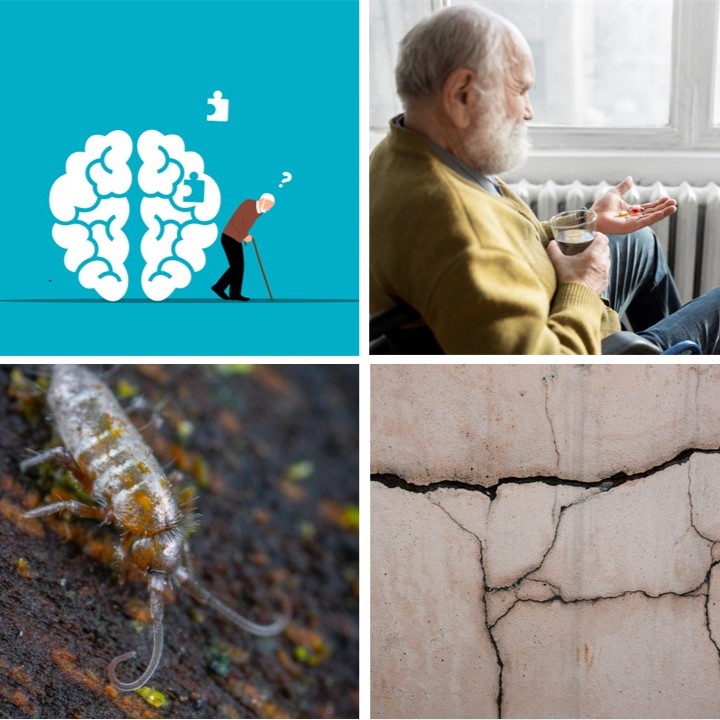10 selected Research Luxembourg results – October 2024
11 November 2024

Luxembourg News in Science & Research
The link between pollution and cognitive decline; a simplified diagnosis of sleep apnea; tractor magnets; an effective treatment for acute myeloid leukemia; the pandemic as a brake on technological progress: here are the latest scientific news from Luxembourg.
LIST; Flickr; Pixabay; Pexels
This article was originally in French and German on science.lu
Sleep Apnoea: Diagnosing from Your Own Bed
Luxembourg Centre for Systems Biomedicine (LCSB), University of Luxembourg
How can you diagnose sleep apnoea from the comfort of your own bed? With a simple rubber band, a wireless oxygen sensor and artificial intelligence. A team of researchers from the University of Luxembourg has developed DRIVEN, an innovative method for assessing the severity of sleep apnoea without the need for complex equipment or a hospital stay.
Sleep apnoea is a common disorder characterised by airway obstruction, with significant health risks (including heart disease, stroke and diabetes). Early detection and treatment can significantly reduce morbidity and mortality. Polysomnography (PSG) is the standard method used to calculate the number of apnoea events per hour of sleep and to diagnose the severity of the disorder. However, long-term monitoring is challenging because it’s costly, uncomfortable for patients and requires an overnight stay in hospital.
The potential of DRIVEN lies in reducing the burden of this condition on healthcare systems.
To the press release / To the publication
Does Pollution Accelerate Brain Decline?
Luxembourg Centre for Systems Biomedicine (LCSB), University of Luxembourg
An inflammatory phenomenon pould be behind pollution-related cognitive decline.
In a recent study, researchers from the Universities of Rostock, Bonn, and Luxembourg found that systemic inflammation, driven by an increase in monocytes—a type of white blood cell—may explain the cognitive deficits observed with chronic exposure to PM2.5. PM2.5 are fine particulate matter suspended in polluted air (from sources like road traffic and wood, oil, and gas heating), small enough to penetrate the lungs and even enter the bloodstream, posing significant health risks. Long-term exposure to these particles has already been linked to neurodegenerative disorders, such as Alzheimer’s and Parkinson’s diseases.
While most cognitive decline studies focus on the elderly, this study, which analysed data from 66,000 patients in the Dutch Lifelines cohort, also includes young adults.
To the press release / To the publication
COVID-19 Vaccine Saves a Significant Number of Lives
Health Directorate, Ministry of Health and Social Security
A new WHO/Europe study, with contributions from two researchers from Luxembourg, has confirmed that COVID-19 vaccines can save numerous lives.
Between December 2020 and March 2023, vaccines reduced the number of deaths by 59%, saving approximately 1.6 million lives among people aged 25 and over in the WHO European Region. Of these lives saved, 96% were among individuals aged 60 or older, the group most at risk for complications or death.
According to the WHO press release, introducing a new COVID-19 vaccine remains an extremely effective way to reduce hospitalizations and deaths among high-risk individuals, including the elderly, immunocompromised people, those with multiple health conditions, pregnant women, and healthcare workers.
To the press release / To the publication
What Is a Tractor Magnet?
Faculty of Science, Technology and Medicine (FSTM), University of Luxembourg
A researcher in nanomagnetism at the University of Luxembourg has studied the behavior of two-dimensional tractor magnets, or powerful permanent magnets, a specific type of cylindrical magnet. This work presents a theoretical and experimental study on the possible configurations of these magnets.
The minimal tractor magnet consists of a rigid assembly of one attractor magnet, two repulsive magnets, and a fourth follower magnet, which is magnetically stabilized in a minimum energy state.
This publication provides college and university physics professors with the theoretical foundations of this intriguing stability and allows for a detailed experimental analysis of the stability in various magnet arrangements. Tractor magnets have several practical applications, including in industry, demolition, and transportation.
To the press release / To the publication
Layman’s Grand Dossier: All LIST Environmental Research Results
Luxembourg Institute of Science and Technology (LIST)
Environmental research conducted by LIST over nearly ten years is now summarized in an accessible grand dossier, available online for free.
The dossier covers three major environmental themes: biodiversity monitoring, water surveillance and management, and research support for environmental policies and Luxembourgish businesses. For example, LIST monitors the Grand Duchy’s wild pollinator populations, which are in alarming decline due primarily to human activity. LIST also assesses air quality and measures various atmospheric pollutants using its environmental measurement vehicle and other mobile sensors. These tools help identify “hotspots”—areas potentially harmful to human health and the environment.
Some projects incorporate citizen science. One concrete example is the first results gathered through volunteer participation in monitoring cyanobacterial blooms in Luxembourg’s water bodies (Cyanowatch).
To the press release / To the publication

Toward an Effective Treatment for Acute Myeloid Leukemia
Luxembourg Institute of Health (LIH)
A recent study by LIH has revealed promising results for treating acute myeloid leukemia (AML), an aggressive type of blood cancer with a very low survival rate.
In certain AML variants, a key enzyme known as KAT6A fuses with another protein, creating an abnormal protein that fuels the cancer. Unfortunately, these variants have particularly poor prognoses. The LIH study shows that these variants respond positively to WM-1119, a new small therapeutic molecule that inhibits KAT6A’s enzymatic activity.
In cases where KAT6A remains intact, WM-1119 is not effective; however, a potential therapeutic approach could involve the complete degradation of KAT6A. This study brings new hope to patients with aggressive AML and points toward future therapeutic innovations for more complex cases.
To the press release / To the publication
An Ex Vivo Model to Study Cell Mobility in Aggressive Brain Cancer
Luxembourg Institute of Health (LIH)
A research team at LIH has introduced an ex vivo approach (experiments conducted on cells or tissues in an environment outside a living organism) to study the mobility of glioblastoma cells in viable mouse brain slice cultures, accurately replicating in vivo characteristics.
Mouse brain slice cultures enable various functional tests: tumour cells can be injected into brain tissue, allowing them to integrate and enabling the study of tumour cell mobility in combination with specific genetic disruptions or treatments.
The researchers outline a protocol involving the preparation and culture of mouse brain slices, followed by the injection of tumour cells, allowing for the analysis of different aspects of cell migration and invasion. This protocol offers a balance between in vitro tests and in vivo models.
The Pandemic: A Brake on Technological Progress
Luxembourg Institute of Socio-Economic Research (LISER)
The pandemic has slowed technological advancement, according to a study conducted by LISER, ZEW Mannheim, and other research institutions.
While companies did spend more on technology for remote work, investments in advanced production equipment and information technologies declined, with some major projects delayed or abandoned altogether. Most investments in modern digital technologies occurred before the pandemic, with a pandemic-related investment shortfall of about 50%. Contrary to public perception, the pandemic did not accelerate digitalization but actually delayed technological development by nearly a year and a half.
According to the study’s authors, this trend does not bode well for productivity growth or economic recovery.
To the press release / To the publication
Better Understanding the Role of Sex in Complex Disease Research
Luxembourg Centre for Systems Biomedicine (LCSB), University of Luxembourg
Many complex diseases (involving multiple genes and external factors) show pronounced differences between sexes, including the initial risk of developing the disease, clinical symptoms, and disease progression. Despite this, computational studies of molecular data related to these diseases tend to filter out sex-specific effects rather than attempt to interpret them.
A recent study by LCSB tackles this issue: it examines and compares the advantages, pitfalls, and limitations of various conventional statistical analyses. Specifically, the study focuses on bioinformatics approaches dedicated to exploring molecular differences between sexes in complex diseases.
The researchers emphasize that beyond traditional statistical methods, approaches are needed that integrate knowledge of hormonal interactions, gene regulation networks, and the links between genes and sex, in order to provide an adequate interpretation of sex-dependent disease alterations.
To Live Happily, Let’s Get Involved
A new publication from STATEC explores the role of civic engagement in mitigating the negative effects of difficult life circumstances in three key areas—employment, marriage, and health—on individual subjective well-being.
Civic engagement is an important form of social capital, encompassing actions that positively contribute to the collective life of the community or society. The study’s findings reveal that both formal institutions and informal sources, such as social capital, can provide valuable support to individuals facing stressful situations like divorce, separation, or widowhood.
Active participation in associations, along with three forms of civic engagement (donating money, volunteering, and helping strangers), promotes subjective well-being and partially mitigates the effects of poor health.
Author: Diane Bertel
Editor: Lucie Zeches (FNR) ; Hélène Jacuszin (Research Luxembourg)








